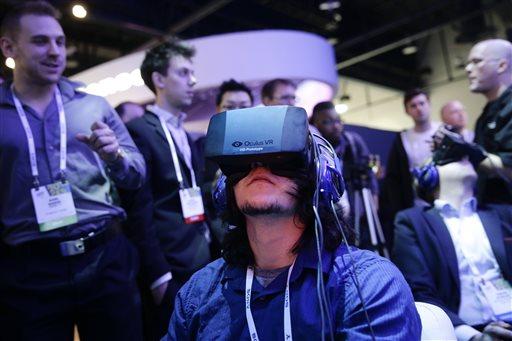For those who think this world is too depressing, your lucky day may be around the corner.
News spread around the tech world Tuesday that Facebook had agreed to buy virtual reality firm Oculus VR for $2 billion. That’s right — if your life is not rewarding as it is, you will soon be able to don a headset that allows you to escape it entirely.
While this seems like exciting news to some, especially those who watch “Star Trek,” we are in danger of putting even more emphasis on interaction through technology instead of actual communication.
Facebook seeks to integrate its social networking into the headsets so friends can be beamed to your virtual universe as if they are actually there.
So aside from opening yourself up to blindside tackling, you can ditch your boring, human friends for some new ones on the Internet. And instead of taking a real, sunny walk through the Quad, maybe you can just enjoy it from your sofa.
Facebook CEO Mark Zuckerberg offered some more exciting prospects of the immersive 3-D technology.
“Imagine enjoying a court side seat at a game, studying in a classroom of students and teachers all over the world or consulting with a doctor face-to-face — just by putting on goggles in your home,” he wrote in a Facebook post.
Some of these ideas seem innovative and possibly even revolutionary, but they only increase the rate at which we replace real experiences with virtual ones.
As everything in this century becomes more digitized, we are gradually losing basic living skills like interpersonal social interaction. If Facebook succeeds in making a marketable virtual reality, where does this leave us?
Will we replace real friends with virtual, computerized ones? Will we substitute memorable experiences like attending a basketball game for a virtual courtside seat? Will we be able to trust physicians who can’t actually examine their patients?
These are questions that are sure to arise if a product ever hits the market. But still, most people will probably only use them to play video games.
The acquisition comes on the heels of Facebook’s $16 billion deal to purchase the messaging app WhatsApp last month. In essence, the social media hegemony is purchasing technology and programming in all the areas it can in a wave of horizontal integration.
They are not alone. By now, everyone has heard of Google Glass, the first widely marketed digital headgear. Once this kind of technology becomes commonplace on the streets of Baton Rouge, we can kiss all semblance of social propriety goodbye.
Google Glass users have already earned the term “glassholes” to describe their behavior while wearing the gadget.
I pray I never see the day when normal, upstanding citizens have to rely on head-mounted hardware to perform everyday tasks. However, hope may be lost as our country has been embracing every adaptation of technology with open arms. If we are on a path to become consumed in what isn’t happening around us, then at least we can draw a line on wearing virtual reality helmets on the street.
The problems facing our generation are numerous, and it would be unreasonable for someone my age to argue that improvements in technology will not enhance our lives. But if we are escaping to a world of alternative reality instead of improving our lives, we aren’t accomplishing anything.
It’s like Joaquin Phoenix hoping he can have a relationship with a phone operating system instead of a human being in the film “Her.” There’s no point in living in the real world if you need a fake one to fall back on.
Eli Haddow is a 21-year-old English and history junior from New Orleans.
Opinion: Facebook’s virtual reality investment discouraging
By Eli Haddow
March 26, 2014

FILE – In this Jan. 7, 2014 file photo, show attendees play a video game wearing Oculus Rift virtual reality headsets at the Intel booth at the International Consumer Electronics Show(CES), in Las Vegas. Facebook said Tuesday, March 25, 2014, it has agreed to buy Oculus for $2 billion, betting that its virtual reality may be a new way for people to communicate, learn or be entertained. (AP Photo/Jae C. Hong, File)
More to Discover







